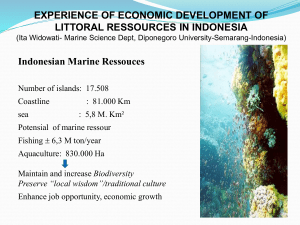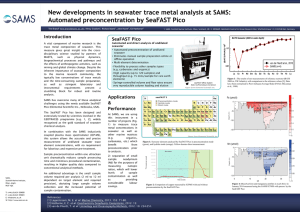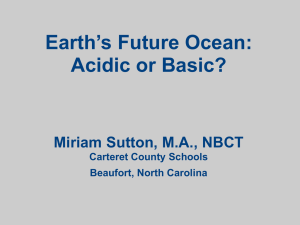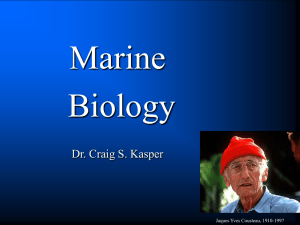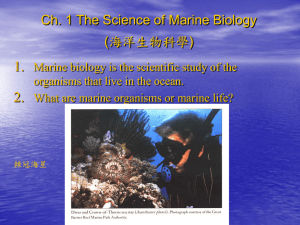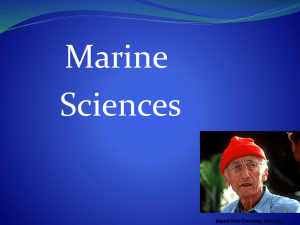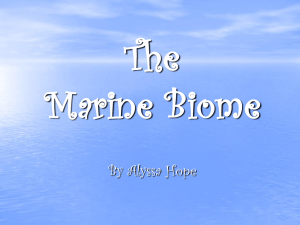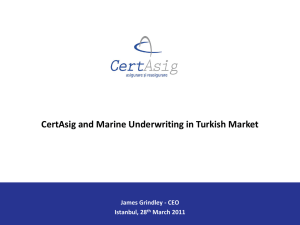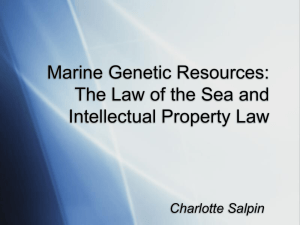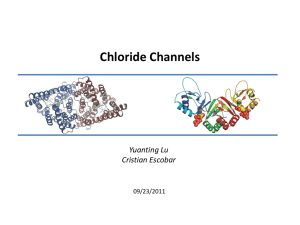Osmoregulation in Marine Teleosts
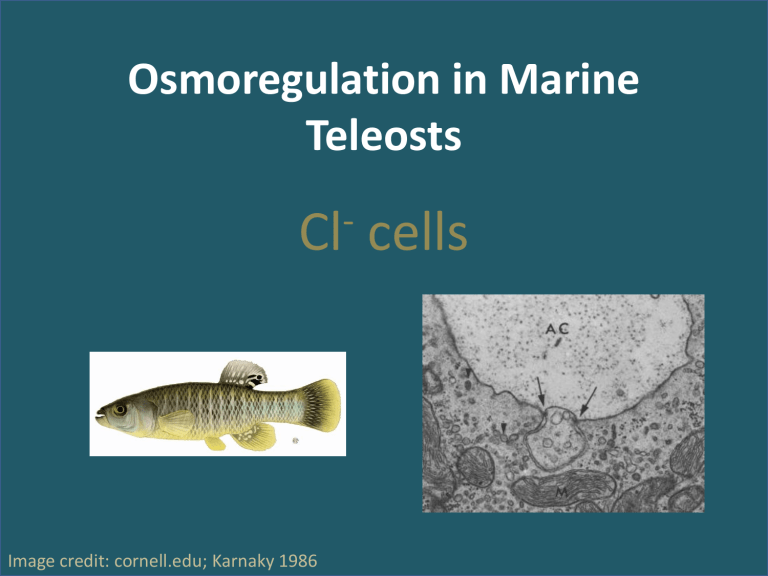
Osmoregulation in Marine
Teleosts
Cl
-
cells
Image credit: cornell.edu; Karnaky 1986
Image credit: amazon.com
amazon.co.uk
Osmoregulation:
• Regulation of osmotic pressure of internal fluids
Osmoregulation:
• Regulation of osmotic pressure of internal fluids
• Osmosis
Osmoregulation:
• Regulation of osmotic pressure of internal fluids
• Osmosis
• Excretion, ingestion, absorption
Three common marine strategies:
1.
Osmoconform
• Agnathan hagfish & many marine invertebrates
• Conform internal [ion] to [external medium]
Three common marine strategies:
1.
Osmoconform
• Agnathan hagfish & many marine invertebrates
• Conform internal [ion] to [external medium]
• Evidence of marine origin for vertebrate life?
Image credit: hawaiianatolls.org ; sagepub.com
Three common marine strategies:
2.
Osmoconform and ion regulate
• Sharks, coelacanth and some amphibians
• Plasma concentrations > seawater
• NaCl concentration ~ 1/3 seawater
Image credit: templecuttingedge.files.wordpress.com; abdn.ac.uk; sagepub.com
Three common marine strategies:
2.
Osmoconform and ion regulate
• Sharks
• Plasma concentrations > seawater
• NaCl concentration ~1/3 seawater
• Urea & Trimethylamine N-oxidase (TMAO)
• Internal fluids ~5% saltier than seawater
Image credit: templecuttingedge.files.wordpress.com; abdn.ac.uk; sagepub.com
Three common marine strategies:
2.
Osmoconform and ion regulate
• Sharks
• Plasma concentrations > seawater
• NaCl concentration ~1/3 seawater
• Urea & Trimethylamine N-oxidase (TMAO)
• Internal fluids ~5% saltier than seawater
• Rectal gland
Image credit: templecuttingedge.files.wordpress.com; abdn.ac.uk; sagepub.com
Three common marine strategies:
3.
Osmoregulate
• Teleosts
• Regulate Na + & Cl ~1/3 seawater
• Salt removal
• Esophagus
• Intestines
• Gill chloride cells
Image credit: wikipedia.com; sagepub.com
Other regulators:
• Marine birds/reptiles
• Salt gland
• Allows to drink saltwater and consume aquatic
(salty) plants and animals
Image credit: nicerweb.com; wordpress.com
Other regulators:
• Plants – mangroves
1. Roots prevent salt from entering but allow water in
2. Excrete salt from glands on leaves
3. Concentrate salt in old leaves, flowers, bark
Image credit: wikimedia.org
Three common marine strategies:
Solutes Seawater 1) Invertebrates & hagfish
Na+ 470 500
Cl-
Urea
570
0
500
0
TMAO
Total
0
1040
0
1000
2) Sharks 3) Teleosts
350
350
230
170
1100
180
180
0
0
360
Units = mosmol
Marine teleosts
• The problem
• Internal fluids hypotonic to seawater
• Constant water loss
• Constant ion gain
Image credit: mrupp.info
Marine teleosts
• The problem
• Internal fluids hypotonic to seawater
• Constant water loss
• Constant ion gain
• The answer
• Drink constantly
• Absorb NaCl and water from ingested seawater
• Keep water
• Excrete NaCl
Image credit: mrupp.info
How do they pull this off?
Image credit: mrupp.info
How do they pull this off?
American Physiological Society
• August Krogh Distinguished Lectureship
• Bodil Schmidt-Nielsen (1994)
• Jared Diamond (1995)
• Knut Schmidt-Nielsen (1996)
• George Somero (2000)
• Peter Hochachka (2001)
• David Evans (2008)
The characters:
• August Krogh
•
1874-1949
• Danish
• 1920 Nobel
Prize for capillary blood flow
• Gas exchange
• Respiration
• Diffusion
• Homer Smith
• 1896-1962
• American
• Kidney function and structure
• MDIBL
• Ancel Keys
• 1904-2004
• American
• Krogh’s postdoc in early
1930s
• Influence of diet on health
Image credit: nndb.com; niehs.nih.gov
The characters:
• August Krogh
•
1874-1949
• Danish
• 1920 Nobel
Prize for capillary blood flow
• Gas exchange
• Respiration
• Diffusion
• Homer Smith
• 1896-1962
• American
• Kidney function and structure
• MDIBL
• Ancel Keys
• 1904-2004
• American
• Krogh’s postdoc in early
1930s
• Influence of diet on health
Image credit: nndb.com; niehs.nih.gov
The characters:
• August Krogh
•
1874-1949
• Danish
• 1920 Nobel
Prize for capillary blood flow
• Gas exchange
• Respiration
• Diffusion
• Homer Smith
• 1896-1962
• American
• Kidney function and structure
• MDIBL
• Ancel Keys
• 1904-2004
• American
• Krogh’s postdoc in early
1930s
• Influence of diet on health
Image credit: nndb.com; niehs.nih.gov
Basis for question:
• Krogh, Smith, Keys, understood that marine fish were hyposmotic to seawater
• Consequences = dehydrate & gain salts
• How do they regulate against this?
Krogh with freshwater fish:
• Salt uptake from head region
• Probably gills
• Guessed at Cl /HCO
3
& Na + /NH
4
+ exchangers
Smith with marine fish:
• Continual drinking
• Intestines remove ions and water
• Extrarenal ion elimination pathway
• Excess ions excreted through gills?
Image credit: Evans 2008
Keys with marine eels:
• Perfused heart-gill preparation
Image credit: Keys 1931
Keys with marine eels:
• Perfused heart-gill preparation
Image credit: Keys 1931
Keys with marine eels:
• Perfused heart-gill preparation
• Gills site of active Cl excretion
These studies formed the framework for the model of ion regulation we use today
Image credit: Keys 1931
Chloride Cells - gill morphology
Image credit: imageshack.us; webshots.com
Chloride Cells - gill morphology
Image credit: Karnaky 1986; webshots.com
Chloride Cells
Image credit: Karnaky 1986; Degnan et al. 1977
Chloride Cells - Cl current & opercular epithelium
Ussing Chamber
Opercular epithelium
Apical
(seawater)
Basolateral
(blood)
Image credit: warneronline.com
Chloride Cells - Cl current & opercular epithelium
Ussing Chamber
Voltage recording electrode
Current injection electrode
Apical
(seawater)
Opercular epithelium
Basolateral
(blood)
Image credit: warneronline.com
Chloride Cells - Cl current & opercular epithelium
Ussing Chamber
Voltage recording electrode
Current injection electrode
Apical
(seawater)
Opercular epithelium
Cl -
Basolateral
(blood)
Image credit: warneronline.com
Chloride Cells - Cl current & opercular epithelium
Image credit: Degnan et al. 1977
Chloride Cells - Cl current & opercular epithelium
Image credit: Degnan et al. 1977
Chloride Cells - Cl current & opercular epithelium
Image credit: Foskett and Scheffey 1982
Chloride Cells - the mechanism
Image credit: Evans 2008
Chloride Cells - the mechanism
-70 mV
-15 mV
Image credit: Evans 2008
Discussion Questions
• Trade-offs
• Energy required to kep up this process
• Why no osmoconform and ion regulate as sharks do?
• Euryhaline fish?
• Early, simplistic experimental approaches lost?
Chloride cells - Cystic Fibrosis (CF)
• Caused by mutation in CFTR protein
• In humans, creates
• sweat
• digestive juices
• mucous
• CF patients with CFTR failure
• Cl- buildup
thicker, nutrient-rich mucous in lungs
bacterial infection
• Increased Na+ & Cl- uptake
decreased water reabsorption
dehydrated
thick mucous
• Lungs, pancreas, intestine
• Most common fatal, inherited disease in U.S.
• Life expectancy = 36 yrs
Three common marine strategies:
1.
Osmoconform
• Agnathan hagfish & many marine invertebrates
• Conform internal [ion] to [external medium]
• Blue crab example
• Salinity < 28 ppt: regulate
• Salinity > 28 ppt: conform
Image credit: flyingfishshop.com

